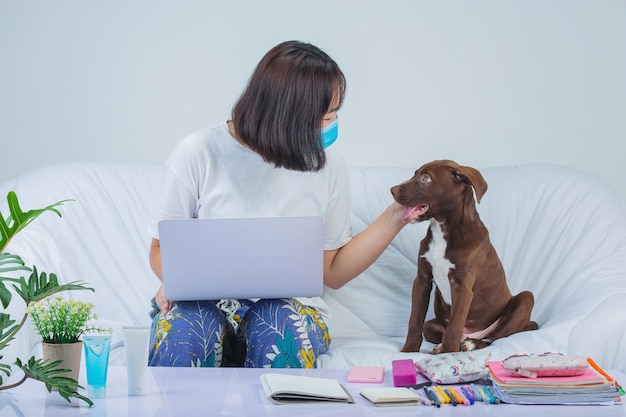Recognizing Signs Your Pet Needs a House Call Vet

Recognizing Signs Your Pet Needs a House Call Vet
When your pet isn’t feeling their best, even the thought of a car ride or waiting room can feel overwhelming for both of you. At Passion Fur Paws, we understand that bringing veterinary care directly to your home in Summit County, CO not only reduces stress, but also allows for quicker, more comfortable attention to your pet’s needs. Whether you are searching for a mobile vet house call near me or have questions about subtle pet illness symptoms, knowing when to request a house call can make all the difference in your pet’s health and happiness.
In this blog, we will guide you through the most important signs that indicate your pet may benefit from an in-home veterinary visit, explain what causes these symptoms, and highlight how mobile vet services like ours can provide timely diagnostics and compassionate care. You’ll also find advice on home monitoring, prevention tips, and clear guidance on when it’s time to reach out for professional help. Throughout, we’ll show you how our mobile veterinarian team serves Summit County and surrounding communities, offering everything from wellness care to emergency services—all in the comfort of your own home. If you’re wondering about comprehensive pet examinations or the advantages of mobile pet care, you’ll find helpful answers here. For more details on our in-home exam options, see our page on wellness and illness examinations for pets in your home.
Spotting Pet Illness Symptoms That Call for a Mobile Vet House Call
Understanding Common Pet Illness Symptoms
Recognizing when your pet is unwell can be challenging, especially since dogs and cats often hide discomfort. In-home visits provide a unique opportunity for our veterinary professionals to observe your pet where they feel safest. Some of the most telling pet illness symptoms include sudden changes in appetite or thirst, unexplained weight loss or gain, vomiting or diarrhea, coughing or sneezing, lethargy, or difficulty moving. Other warning signs to watch for are visible lumps, wounds that won’t heal, persistent scratching, changes in urination or bowel habits, or an unusual odor from the mouth or ears. Behavioral shifts, such as hiding, aggression, or excessive vocalizations, can also signal underlying problems.
For pets with chronic health conditions, new or worsening symptoms may suggest complications that require professional attention. An example might be an older dog who suddenly struggles to stand or a cat that starts urinating outside the litter box. If you notice any of these symptoms, especially if they persist for more than a day or two, a mobile vet house call can help get to the root of the issue quickly.
When Are Mobile Vet House Calls Especially Important?
Certain life stages and health conditions make in-home care especially valuable. Senior pets, for example, often benefit from the familiar environment of home, where mobility challenges and anxiety are minimized. Likewise, pets with compromised immune systems or those recovering from surgery may face increased risks when exposed to other animals in clinics. If your pet is highly anxious, reactive around other animals, or has a history of stress during car rides, a mobile veterinarian near me can provide much-needed relief for both you and your furry companion.
Why Do These Symptoms Occur? Understanding the Causes Behind Pet Health Changes
Pet illness symptoms can stem from a wide range of underlying causes, from infections and parasites to chronic diseases or sudden injuries. Infections may include respiratory issues, skin conditions, or gastrointestinal upsets that can be contagious or triggered by environmental factors. For instance, pets in Summit County might be exposed to tick-borne diseases or seasonal allergies unique to the area’s climate. Chronic issues such as kidney disease, diabetes, or arthritis are more common in older pets and may develop gradually, making early recognition critical.
Environmental stressors, dietary changes, exposure to toxins, or trauma can contribute to sudden health changes. For cats, moving furniture or adding a new family member can lead to behavioral symptoms that mimic illness. Dogs who are active outdoors in the local mountain areas may be at risk for injuries, insect bites, or ingesting foreign objects. Understanding these causes helps our veterinary team tailor in-home diagnostic and treatment plans that address both immediate symptoms and long-term health.
How Mobile Vet House Calls Support Diagnosis and Treatment
The Benefits of In-Home Veterinary Diagnostics
When you schedule a mobile vet house call, your pet receives one-on-one attention from our compassionate veterinary professionals. We bring advanced diagnostic tools directly to your home, allowing us to perform thorough physical examinations, draw laboratory samples, and—in many cases—provide immediate results. Services such as pet diagnostic laboratory services for in-home veterinary care and digital radiology services for pets enable us to assess everything from internal organ function and heart health to orthopedic concerns without the stress of travel.
Treatment approaches may involve medication, wound care, fluid therapy, or even minor surgical procedures, all performed with your pet’s comfort as a top priority. For pets needing chronic disease management, our team can create ongoing care plans that fit your routine and your pet’s preferences. Dental health is another area where in-home evaluations can reveal hidden problems, such as tooth abscesses or gum disease, that might otherwise go unnoticed.
What to Expect During Your Mobile Vet Visit
During a mobile vet house call, we begin by discussing your pet’s health history and recent changes in behavior or appearance. Our veterinary team will observe your pet’s interactions with family members and their environment, which often provides valuable diagnostic clues. We then conduct a comprehensive physical exam, collecting samples if needed for further analysis. Depending on the findings, we may recommend additional services such as vaccinations, imaging, or follow-up visits to monitor progress.
If your pet requires more intensive care or surgery, our team will explain options and coordinate next steps, always prioritizing the least stressful path for your pet. For conditions best managed at home, we provide detailed instructions and ongoing support to ensure your pet’s recovery.
Prevention and Home Care: Keeping Your Pet Healthy Between Vet Visits
While not all health issues can be prevented, there are many steps you can take at home to reduce risks and support your pet’s wellbeing. Regular monitoring of your pet’s weight, appetite, energy level, and bathroom habits can help you catch subtle changes early. Maintaining a consistent diet, providing plenty of fresh water, and engaging in daily exercise or playtime contribute to overall health.
Pet-proofing your home by securing hazardous foods, plants, and cleaning products is especially important in active households. For outdoor pets in Summit County and surrounding communities, routine checks for ticks, foxtails, and paw injuries after hikes can prevent secondary infections and discomfort. Senior pets may need ramps, orthopedic beds, or litter boxes with lower sides to accommodate mobility issues.
The importance of routine veterinary care cannot be overstated. Scheduling regular checkups, such as wellness and illness examinations for pets in your home, allows our team to detect early warning signs and provide tailored advice for your pet’s life stage and lifestyle. If your pet is due for annual vaccinations or heartworm testing, a mobile vet house call offers the convenience of in-home preventive care.
When to Seek Immediate Veterinary Help: Making the Right Decision for Your Pet
Some pet illness symptoms require urgent attention, and knowing when to call for a mobile veterinarian near me can be lifesaving. Signs that warrant immediate veterinary care include difficulty breathing, collapse or unresponsiveness, seizures, severe bleeding, sudden inability to walk, persistent vomiting or diarrhea (especially with blood), or suspected ingestion of toxic substances. If your pet’s gums become pale, blue, or yellow, or if they experience heatstroke symptoms on a hot Summit County day, prompt intervention is critical.
For chronic conditions, sudden changes in frequency or severity of symptoms may indicate a complication that needs immediate evaluation. If you’re ever uncertain, it’s always better to err on the side of caution and reach out to our veterinary team. Our mobile services are designed to provide rapid, compassionate care when your pet needs it most, ensuring you never have to transport a distressed or fragile animal farther than your front door.
For after-hours emergencies or more information on our urgent care offerings, visit our page on emergency veterinary care and after-hours options.
Bringing Compassionate Veterinary Care to Your Doorstep
Your pet’s comfort and health are our top priorities at Passion Fur Paws. By recognizing key pet illness symptoms early and understanding when to request a mobile vet house call, you empower yourself to make timely, confident decisions for your furry friend. Our veterinary professionals bring advanced diagnostics, gentle treatment, and personalized advice directly to your home in Summit County, CO and surrounding communities—helping reduce stress and promote healing for every member of your family.
If you’re searching for a mobile vet near me or need expert guidance on pet health concerns, don’t hesitate to reach out. To schedule a house call or discuss your pet’s needs, contact our team at (970) 210-6674 or explore our wellness and illness examinations for pets in your home for more information on how we support your pet’s lifelong wellbeing. Remember, early action and in-home care can make all the difference—let us help you provide the best care possible, right where your pet feels safest.
This blog is intended for informational purposes only and should not replace professional veterinary advice. If you notice concerning symptoms or your pet’s condition worsens, please consult a veterinarian promptly.


















